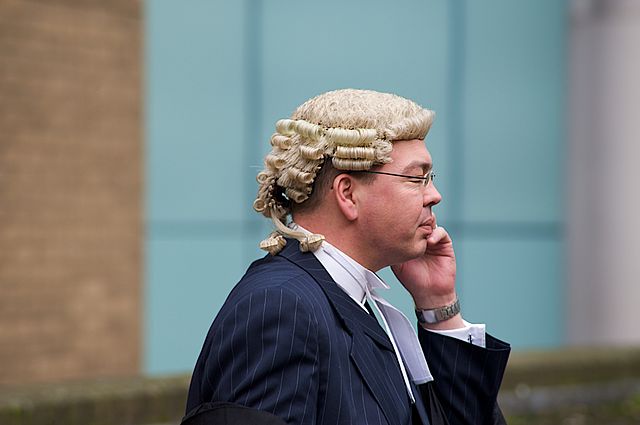Jobs in the legal sector have always proved to be an attractive prospect to career seekers but just what opportunities are really out there and how is the sector changing? We spoke to Andrew Todd, in-house lawyer for Springfield Properties and senior tutor at the University of Glasgow, to find out more.

Can you tell us what made you decide to pursue a career in law?
I loved watching lawyers in court on TV. People shouting “objection” and the whole suspense of whether someone was ‘guilty’ or not.
When I was growing up I only wanted to be a criminal lawyer. At university I even did a class in Forensic Medicine to prepare me for the ‘grisly crimes’ I would be involved in. There was only one problem – I couldn’t get a job. I was rejected by every criminal law firm I applied to. I didn’t even get an interview.
Luckily, after university had finished, and just as I thought I would never get a job, I saw an advert by Scotland’s biggest law firm who were looking for more trainees that year (which was unusual as they would normally recruit two years in advance). I applied. They invited me to interview. I thought I’d aced it. They rejected me. Two weeks later I was about to start work at McDonald’s when they phoned back and said “we’re desperate, we just need more people as we’ve got too much work, can you start?’. And I was in. 12 months later I was standing in a court and… I hated it. It was tedious, time consuming and filled with pointless (to me) rules and regulations. Luckily, I’d already spent six months working in the property department and I knew that was what I wanted to do.
There are so many different areas of the law in which to specialise, what was it that drew you to property law?
Property law is about the world around us. It’s land and buildings. When you buy a house, rent a flat, open a shop, even when you walk down the street you are using property law. Who owns the land? Who owns the street built on top of that land? Who has given you the right to walk down that street?
Every day we’re using property law – it’s the world around us and it’s fascinating to see how it all links together.
How was the job market for legal roles in Scotland at the point when you qualified to work?
I qualified in 2002, right at the start of the property boom. Over the next five years it was possible to walk into any property job in Scotland as law firms were desperate for staff. That changed in 2007-8. For the last six years you would be lucky to see ten property jobs advertised in one year, back then it was ten a week. Today, the market has changed again, law firms are desperate for young lawyers to choose property. For anyone looking to qualify as a lawyer, property and connected areas like planning and construction will see lots of opportunities.
It’s also worth mentioning that law firms are not just looking for lawyers. The last few years have seen more and more firms recruit paralegals. These are jobs that don’t require a law degree and offer the chance to work in a law firm and cover some work that traditionally would have been done by a lawyer. There is a whole new career path for people who want to work in law firms but don’t necessarily have a law degree.

When people think of legal jobs, they probably have the image you mentioned earlier of somebody shouting: “Objection!” But what does the day of a property lawyer actually look like?
I work for Springfield Properties, Scottish Home Awards Housebuilder of The Year 2013 and 2014. For me, property law is now part of a broader role advising the company on all legal matters. When I worked for a law firm, though, a property lawyer would likely be working on many different transactions, some which only take a few days, others which may take years. A typical day will involve making sure any deadlines are kept, contracts are drafted and titles are reviewed. It’s a very varied job. No two properties are the same.
A key part of the job is to always be in touch with clients. For residential property, a new home or flat can be the biggest purchase of their life, so talking to clients is really important to make sure they understand what it is happening. For commercial property, there can a lot of money involved (I was involved in one deal that was valued at £1.2 billion) so, naturally, clients are very keen to know what’s going on.
You’ve moved to the academic side of things now, can you tell us why – and is this an area that also offers opportunities?
I’ve taught part-time at the University of Glasgow for the last three years teaching professional ethics and legal business. I love teaching. The students have completely new ideas about how to deal with clients and how a legal business should be run. It’s easy in law to always follow tradition as law is a very traditional business – just think of the wigs and gowns! – but that doesn’t mean we’re doing the right things. We need to embrace technology, we need to look at ideas that work in other businesses and we need to remember that clients want to be able to use a lawyer as easily as they can order a tin of beans in an online shop.
In Scotland, we still have a separate legal system from England & Wales. That means there while there are opportunities to pursue an academic career, it is limited as we have fewer universities and therefore fewer jobs. If someone was interested in an academic career, a PHD is still an excellent route to take. If you don’t want to work in university there is plenty of scope to pursue academic interests while working as a lawyer. I’ve written one book on law – The Lands Tribunal For Scotland: Law & Practice – and a number of articles for legal journals.
What advice would you give to people studying law who will soon be looking for a permanent job in the sector?
It may not seem like it from the outside but lawyers have changed considerably in the last five years. When I started we still sent documents back and forth with changes handwritten in different colours of ink to show who wrote what and when. Today, computer programmes will pull together documents and automatically make changes. Technology is a key skill to any legal career now.
Saying that, it doesn’t matter how good you are with a computer if you don’t have people skills. Lawyers deal with hundreds of clients. You need to be able to listen to them to know what they want, you need to be able to ask good questions, you need to be able to explain clearly and simply what you will do and how it will affect them. For students, working any service industry, being a waitress, working in a shop, pulling pints behind a bar, is actually far more important to becoming a lawyer than they may first realise. It’s not about being ‘clever’ – as Felipe on The Apprentice found to his cost with his paper skeleton a few weeks ago.
Thank you to Andrew for taking the time to speak to us and giving us such a fascinating insight into both his own experiences and the legal sector as a whole. At s1jobs we always have a variety of legal jobs on offer so whatever type of role you’re looking for in the sector, Scotland’s premier job site remains the one to check.
Photo supplied by interviewee. Other image via Creative Comms licence, by Southbanksteve.
